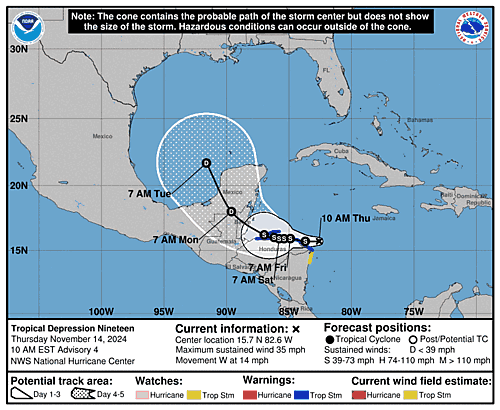Issued at 500 AM AST Tue Sep 17 2024
000 WTNT42 KNHC 170845 TCDAT2 Tropical Depression Gordon Discussion Number 24 NWS National Hurricane Center Miami FL AL072024 500 AM AST Tue Sep 17 2024 After becoming a bit better organized Monday evening with persistent deep convection over the low-level center, Gordon's convective organization has been steady during the overnight hours. Subjective Dvorak intensity estimates range from 25-35 kt, while recent objective estimates from UW-CIMSS are in the 31-36 kt range. Based on these intensity estimates as well as taking into account earlier ASCAT data, Gordon's intensity is held at 30 kt for this advisory. The ASCAT passes Monday evening helped locate the center, but the center has been difficult to find since that time. Recent satellite images suggest that the center may be near the northern edge of the central convective area. The motion is still estimated to be westward, or 265/3 kt, but models indicate that the northward turn should begin within the next few hours. A frontal low currently located several hundred miles north of Gordon has created a weakness in the subtropical ridge, which will induce a northward and then a north-northeastward motion at an increasing forward speed during the next couple of days. Gordon should pass east of this feature Wednesday night or Thursday as it is steered by mid-level high pressure to the east of the cyclone. Some of the global models show this ridge building to the northeast of Gordon, which could cause Gordon to bend more toward the north in 4 to 5 days. There are significant speed differences as well as cross-track spread at days 4 and 5. The new NHC forecast is similar to the previous one through 48 h, but is nudged to the west of the previous official forecast beyond 48 h, closer to the latest consensus aids. During the 3 to 5 day time period, the NHC forecast is slower than the latest GFS model and well to the east of the latest ECMWF global model. Gordon's intensity forecast is challenging. Environmental conditions appear moist enough for Gordon to at least maintain its intensity during the next couple of days, given the weak vertical wind shear and warm sea-surface temperatures. However, global models do not show Gordon intensifying much during the next couple of days as the cyclone interacts with a weakening non-tropical low, currently located north of Gordon. Some strengthening is likely once Gordon moves past this feature, but there is quite a bit of uncertainty in what the upper-level winds will look like over the cyclone in the day 3 to 5 period. The GFS model shows moderate southwesterly shear during that time, whereas the ECMWF and other global models suggest stronger shear from the west or northwest, which would be a less favorable direction and would likely prevent further strengthening. As a result, there is a large spread in the intensity guidance, leading to below average confidence in the NHC intensity forecast. The NHC intensity forecast is similar to the previous one, and remains near the low end of the intensity guidance through the forecast period. FORECAST POSITIONS AND MAX WINDS INIT 17/0900Z 19.0N 49.0W 30 KT 35 MPH 12H 17/1800Z 19.5N 49.1W 30 KT 35 MPH 24H 18/0600Z 20.4N 48.7W 30 KT 35 MPH 36H 18/1800Z 21.7N 48.2W 30 KT 35 MPH 48H 19/0600Z 23.3N 47.5W 35 KT 40 MPH 60H 19/1800Z 25.1N 46.7W 45 KT 50 MPH 72H 20/0600Z 26.3N 45.8W 50 KT 60 MPH 96H 21/0600Z 27.6N 44.6W 50 KT 60 MPH 120H 22/0600Z 30.0N 44.3W 55 KT 65 MPH $$ Forecaster Hagen

